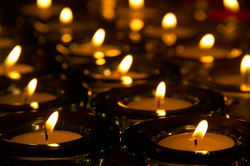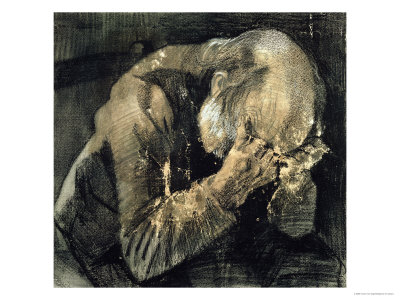The experience of loss and trauma, despite being one of the most common of human experiences, can seem like quite the opposite while you're going through it. Death, job loss, physical injury, serious illness, divorce, financial ruin - these are serious, traumatic events that we may all face at one time or another. And at the time, the alienation, the aloneness, the loneliness, and the pure chaos of having your world turned upside down, can be incredibly difficult to bear. In some instances, even when surrounded by supporters, it can feel like no one truly understands what you're going through.

Grief Rituals
Coping with loss and trauma can be supported by developing basic, but meaningful, rituals.
What Is a Ritual?
A ritual is a set of actions that serves to provide cultural, intellectual, social, ethnic, spiritual, and/or historical ties to people, groups, memories, events, places, objects and more. Rituals can be carried out by groups or individuals; can be simple or complex; and can have meaning that is widely understood and accepted or can have personal, individual significance. They can be steeped in tradition, or they can be newly created. They create feelings of belonging, comfort, normalcy, connectedness, and calm.
Our lives are filled with rituals, and they are often done without thinking or without realizing their significance as rituals. Some people are well aware of their rituals and may refer to them as such.
A common ritual: a cup of hot coffee or tea at the same time every day.
When Loss Occurs
When your world is turned upside down following the death of a loved one, a major change in the status of your health or capacity, the loss of your job or career, or some other traumatic life transition, it is like you lose your compass. Things that once had meaning for you or that played an important role in the routine of your life may no longer exist or be doable. You may begin to wonder if you're the same person you were before the event in question. And the thought of letting go of the person or status that has been lost can feel terrifying, devastating, and even heartless.
Key to dealing with loss, moving through the myriad emotions that accompany grief, and honouring that which must be let go, is finding meaningful ways to ground yourself and find stability. And this can be done through ritual.
Recognizing Ritual
As mentioned above, rituals come in all shapes and sizes, and can be as unique as is an individual. It is not necessarily helpful to look at someone else's life to decide what might be meaningful and helpful to you.
So, if you're dealing with loss and are looking for rituals or activities that will help you focus, cope, and process, how do you decide what to focus on?
Doing a little analysis, reflection or review of your life and your activities can be helpful. As always, I'm a big advocate of writing, but quietly meditating or thinking, or sitting down to talk to someone (a friend, a therapist) can help you explore some of the things you've done in the past to hold life together.
You may find that your typical activities in the past have had different purposes or focuses, and it is a good idea to make note of them:
- There are activities you've done to calm, stabilize, and/or add meaning to your life, that you can still do after the loss.
- There are activities you've done for the purposes above that may not be possible after your loss.
- There are things you did in the past that were purposely focused on the very thing you have lost, which now seem too painful to contemplate revisiting or are impossible to do post-loss.
With the first two categories of activities, they may or may not be directly related to your loss. They were important elements of your life, and these are the types of rituals that can help you put stability back into your life post-loss either in their previous form or in a modified form. With the last category, the activity is tied directly to the object of your loss. The ritual may have had a stabilizing effect, but reincorporating it or modifying it can help you move through the grief process into a state of acceptance and growth.
Let's look at some examples, and then discuss how to reincorporate or modify rituals.
Example: Loss of Capacity
To use an example from my own life, I'll demonstrate the process I went through to put my situation into perspective. I began developing some serious problems with my knees and feet in my early 20's that greatly impacted my physical life and my identity. I had been an extremely active person, and the realization that my life was going to have to change drastically was devastating to me. I categorized important rituals in my life (and I'll provide one for each of the above categories):
Stabilizing Ritual - Still Possible
I started every morning with a pot of tea. I realized I had come to associate preparing and consuming a hot beverage that had been introduced to me by my grandmother with a private moment during which I could plan my day. This was a ritual that was meaningful, and still possible - a way to keep stability in my life as I made adjustments to other parts of my identity.
Stabilizing Ritual - Not Possible Unless Modified
I'm an emotional eater, and it can often seem ritualistic. My day sucks, so I get some chocolate. Suddenly, things look a lot better, and I feel calmer. It is not something related to or that came out of my high activity levels. I have always been that way. With the onset of my serious knee problems, I realized that my food rituals were going to have to be adjusted.
Ritual Directly Related to Loss - Not Possible Anymore
I used to run alone in the evenings regardless of the weather. Running represented freedom and health to me, and I felt in control and vigourous both before and after. This ritual was directly tied to my identity as a runner and active person, and it had been taken from me. I would have to find ways to honour that loss, if possible.
Maintaining Stability
It's very common when dealing with loss and trauma to withdraw. Social contact may lessen, going out may lessen, familiar routines may be set aside. But it is at these times, especially, that those activities that promote stability and familiarity should be maintained.
After you've done an analysis like the one outlined above, try to hold onto some of the simpler activities or rituals. Having something to look forward to that will give you no surprises is really important so that you can garner your energy to face the tougher things during your period of healing. Being able to say, "I have no idea what I'm going to do next, but at least I can count on a pot of tea in the morning." is not a bad thing when you're first getting your bearings.
Making Adjustments
This is the harder part. Some rituals are directly associated with a difficult-to-accept loss. It may seem easier to ignore it or put off dealing with it until 'tomorrow'.
Instead of seeing a loaded activity as a painful reminder, find a way to turn the ritual into something that puts the loss to rest and honours it in a way so that you can move forward into new identity development.
Those who've lost a loved one may decide to make a yearly donation to the person's favourite charity as a ritual that honours them and allows forward movement in healing. One who has a loss of capacity may modify their bi-annual running shoe shopping ritual to one that allows for the purchase of walking shoes. Instead of closing off that part of one's life, identity is adjusted to accommodate the loss, and forward movement becomes possible.
As mentioned above, ritual - a set of activities designed to create ties - are often completely unique to an individual, and it is up to that individual to chose activities that are meaningful and that represent the identity he or she wishes to have.
Books for Rituals and Healing from Loss
You might also like
Writing to HealTry using writing as a healing tool when facing emotional pain due to loss an...
The Good Villager on WizzleyThe Good Villager writes in a few different places when not teaching postgrad...








 Writing Posthumouslyon 05/08/2013
Writing Posthumouslyon 05/08/2013
 God or The Queen: Your Choiceon 05/04/2013
God or The Queen: Your Choiceon 05/04/2013
 Broken Ankle Boogieon 05/02/2013
Broken Ankle Boogieon 05/02/2013
 Toulouse-Lautrec: Approaching Humanity with Different Brush Strokeson 05/01/2013
Toulouse-Lautrec: Approaching Humanity with Different Brush Strokeson 05/01/2013



Comments
Thank you kindly :)
Some great stuff here and thanks for sharing your personal details, it always makes it more relevant to get suggestions from someone who has been "on the front lines" :)